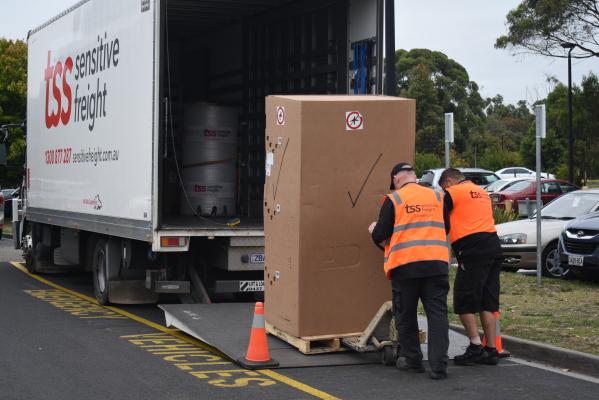
By Trevor Jackson
A SPECIALISED freezer required to hold up to 130,000 COVID-19 vaccines arrived at Mount Gambier Hospital Thursday ahead of Wednesday’s planned vaccination rollout.
The freezer – the first of its kind in regional South Australia – will be able to store the Pfizer vaccine, which requires a -70 degree Celsius temperature.
Limestone Coast Local Health Network executive director of Medical Services Dr Elaine Pretorius said the freezer’s arrival at the vaccination hub was exciting.
“COVID has been my life for the last 18 months or so,” Dr Pretorius said.
“I think the scientific advances we have seen in the last 18 months across the world have been astonishing.
“I think being able to have a vaccine – four different vaccines – that are being distributed world wide is just awesome.
“What this (freezer) does is allows us to start vaccinating.”
The first doses of the vaccines are to be administered on Wednesday, March 10.
The roll out will progress in different phases, with the initial phase 1a to include frontline workers and others who are most likely to be exposed.
That group includes emergency department staff, workers who are checking people in at the front door of the hospitals and those doing the swabbing at test centres.
Aged care workers and all residents in age care facilities will also be included in the initial roll out.
Frontline workers and age care workers inline for the first round of vaccinations will be notified to attend their particular site beginning next week.
Teams will attend age care facilities to administer the vaccine to residents.
Unlike the recent requirement to have a flu vaccination in order to visit an age care facility, at this stage it is not the case with the COVID-19 vaccination, so residents can still have visitors.
The Mount Gambier Hospital will distribute the Pfizer vaccine to the various sites in the region, with care needed in the handling of the sensitive vials.
Initially the vaccine needs to be stored at -70 degrees, then defrosted completely before being transported in specially designed containers and kept between two and eight degrees for up to five days.
Once opened the vials must be used within six hours, creating a huge logistical task to ensure no wastage.
Once the first phase is complete, phase 1b will begin, which will include the remainder of the health care workers, then people with disabilities and disability care workers.
Phase 2 includes the elderly and people with comorbidities or chronic diseases which put them at risk.
“Phase 1a and 1b will be done in the hospitals,” Dr Pretorius said.
“When phase 2 commences it is likely the GP practices and some community pharmacies will start contributing because the prime minister has undertaken all Australians will be vaccinated by October.”
While initially the Pfizer vaccine will be rolled out, Dr Pretorius said she expected the AstraZeneca vaccine to arrive in the coming weeks.
While the vaccines will not provide immunity to the COVID-19 virus, she said it was an important part of the fight against the disease, which would help protect the region as a whole, should an outbreak occur.
“We have seen what COVID can do to the health system,” Dr Pretorius said.
“The NHS has almost buckled under the load.
“This means even if we have a bit of an outbreak in the South East we can be comfortable our health system can manage it.
“We have a lot of people visiting from Victoria and Adelaide and more as the borders open, so it means we can be protected and the risk of a sudden big outbreak in the South East is limited.”







